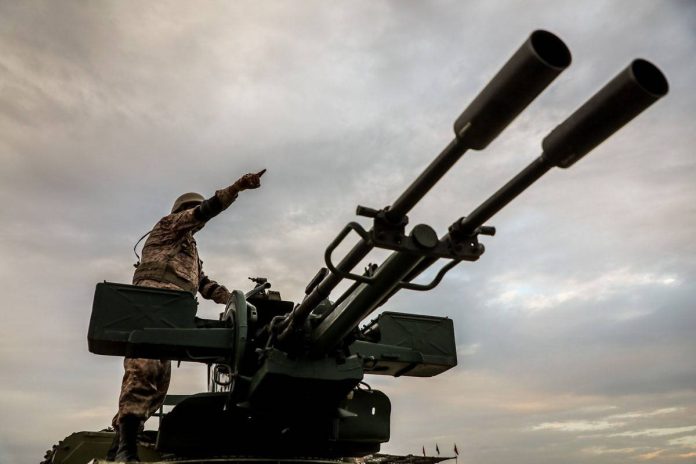The Global Firepower ranking was published on January 6. The annual report classifies the world’s strongest militaries based on over 60 factors, including size, spending and technological advancements.
The report, which placed the United States military on top, followed by Russia, China, India and the UK, raised more questions than answers, with some accusing GFP, the organization that compiled the report, of being biased, sloppy and highly politicized.
For example, while Russia maintained its former position as the second strongest military in the world, Ukraine jumped by seven spots, to occupy the 15th position. This raises questions: how did GFP possibly estimate the current capabilities of the Ukrainian military nearly a year after a devastating war that destroyed much of Kyiv’s original military hardware, especially when the Pentagon itself is still unable to track the massive shipments of weapons delivered to Ukraine since the start of the war?
A more pertinent set of questions must be asked: is this truly the time for chest-thumping about military strength and frivolous spending on hardware, an act that is ultimately aimed at generating profits, instilling fear and killing people?
Following the Paris Agreement on the environment of 2015, many governments appeared to have finally risen to the occasion, by collectively agreeing that climate change is, indeed, the greatest danger facing humankind. That promising moment did not last for long, however, as the US Administration of Donald Trump reneged on Washington’s earlier commitment, thus weakening the resolve of others to lower greenhouse gas emissions by at least 40% by 2030.
Then the Covid-19 pandemic struck, shifting the world’s attention increasingly away from what suddenly seemed to be a less urgent climate crisis. For some, the new focus was mere survival; for others, the devastating economic consequences of the pandemic; for the poorest countries, it was both.
“The world’s poorest countries have been hardest hit, with women and children bearing a disproportionate burden,” according to a report published by Oxfam in March 2022. This is to be expected.
Even before the world managed to heal from its global ailment and its equally deadly variants, the Russia-Ukraine war began early last year. For Russia, it was, in part, a bold attempt at confronting the decade-long violence in the Donbas; for the West, it was a last stand to defend an unsustainable unipolar world order.
The resultant global competition is unprecedented since World War II, which killed up to 60 million people, shattered many economies, led to mass migrations, devastated the environment and redrew the map of many nations and, by extension, the world’s geopolitics.
And, just like that, we are back to the harsh realities of the ‘great games’ of yesteryears – and with it, the unbearable price tag of death toll, economic dissolution and the gradual, but at times, irreversible damage to the environment.
In times like this, the number of dead becomes, for some of us, daily statistics devoid of emotions or meaning. Thus, tens of thousands of dead and many more wounded cease to become individuals with feelings, hopes and aspirations. They are mere fodder in a war that must be won at any price so that an old world order can be sustained a bit longer, or a new one is allowed to be born.
The millions of war refugees also become detached from their real value as people with rooted identities, a deep sense of belonging, and histories that span many generations. Their usefulness barely extends beyond the need to serve as one of the numerous facets of a propaganda war, where one side, and one side alone, deserves all the blame.
Rarely do we also reflect on the unintended – and sometimes intended – consequences of the war. While, ironically, Europe continues to pray for a warm winter to survive its ongoing energy crisis, others are too deep in their own crises resulting from the war.
Is all of this worth the price of blood and gore that is being paid on a daily basis? Warmongers often think so, and not because of some pathological urge for violence, but because of the astronomical profits often associated with long-term conflicts.
Global conflicts often lead to sharp increases in arms sales, worldwide, as every government wants to ensure, in the post-war world order, it will be able to command greater influence and respect. Those who have climbed in the GFP ranks, naturally, want to maintain their hard-earned status; those who fell in rank would do anything to rise again. The outcome is predictable: more weapons, more conflicts and more profits.
And, in the midst of it all, poverty, homelessness, social inequality, climate disasters, and global responses to pandemics are all relegated to the bottom of our collective list of priorities, as if the once critical matters are of no particular urgency.
But what is the point of having a strong army, and a weak, unequal, unfree, impoverished, and pandemic-ravished society? This is certainly not a question for Global Firepower to answer because change does not start through the ranking of strong or weak militaries but is spawned within society itself.
Feature photo | A Russian T-72 moves to a firing position in the course of Russia’s military operation in Ukraine, at the unknown location. Konstantin Mihalchevskiy | Sputnik via AP
Dr. Ramzy Baroud is a journalist, author and the Editor of The Palestine Chronicle. He is the author of six books. His latest book, co-edited with Ilan Pappé, is ‘Our Vision for Liberation: Engaged Palestinian Leaders and Intellectuals Speak out’. His other books include ‘My Father was a Freedom Fighter’ and ‘The Last Earth’. Baroud is a Non-resident Senior Research Fellow at the Center for Islam and Global Affairs (CIGA). His website is www.ramzybaroud.net
The post Strong Militaries, Weak Society: The Missing Story in the Global Firepower Ranking appeared first on MintPress News.
